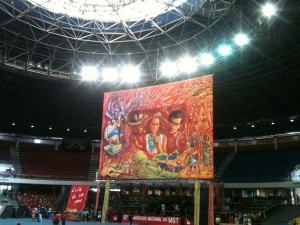A year ago today I spent much of the day on planes coming back from 10 glorious days with the Landless Workers Movement (MST) in Brazil. I attended their National Congress and spent a few days visiting MST settlements with a delegation put together by the Friends of the MST.
The MST is one of the largest social movements in the world, with over a million members. The movement has won land for over 350,000 families, and has a three part program: reclamation of land, collective production and transformation of society. The movement celebrated its 30th anniversary during the time I was there, and the National Congress functioned as a massive birthday party, agricultural fair, political education school, and a time of strategy, visioning, and building community.
The trip I took one year ago could not have come at a better time for me on my personal/political journey. I am someone who has found myself driven to collective action through my own early life experiences in the context of my family, and an early visceral sense that there were larger forces and structures at play on the people in my household, which were invisible to me at the time. My experiences within organizing communities in Philadelphia and throughout the country have provided both beautiful and extremely painful experiences – sometimes feeling more like the culture of a dysfunctional family than a force for good and liberation.
Over the last few years in particular, I’ve been driven to evaluate and transform myself, and my approach to and practice of organizing, after asking myself the question “If we (loosely defined as those working for social justice) were in charge tomorrow, what would that be like?” and not liking the answers that come to mind.
Over the past 30-40 years, the time period in which I have grown up, have arisen three (to me, inter-related) phenomena: 1) the ascendance of neo-liberalism, 2) the emergence of the non-profit industrial complex and 3) the primacy of organizing based on identity categories. Although we don’t often look at connections between these three developments, it seems more than co-incidence that all three have occurred together. Delving deeply into the implications of this is a subject for another time.
In working to transform my own practice, I have committed to increasing myself awareness through my own healing work. There is a lot of trauma in our people, and the saying “hurt people hurt people” really is true. There is no way to move forward when we are simply acting out trauma onto each other under the guise of organizing.
There are a number of lessons that I drew from Brazil that I’ve committed to incorporating into my own practice:
Collective action should bring us back to life. It must activate us as whole people. What we do must be connected to a long term vision and strategy. It must develop us into better people – not just people who know the right things to say. We must live by a new set of values, not just speak them. We can use the immediate to secure the future – if we prioritize political education. Our work is not sustainable if we organize as individuals – we must organize as families and communities. If we can’t presume to lead our society, and not just people who look like us, then the system that we are working to transform has already won.
For me over the past year this has looked like:
- Prioritizing 1 on 1 time with leaders
- Building an organizational culture where values and principles are a focus internally as well as externally
- Creating a separation between my paid work and my organizing work
- Seeing individual expressions of oppression as symptoms, not causes
- Focusing on my own healing work and sharing it in my organizing community
Here’s to a 2015 filled with humanization of our movements.

This was beautifully written, your thoughts and commentary speak to me!